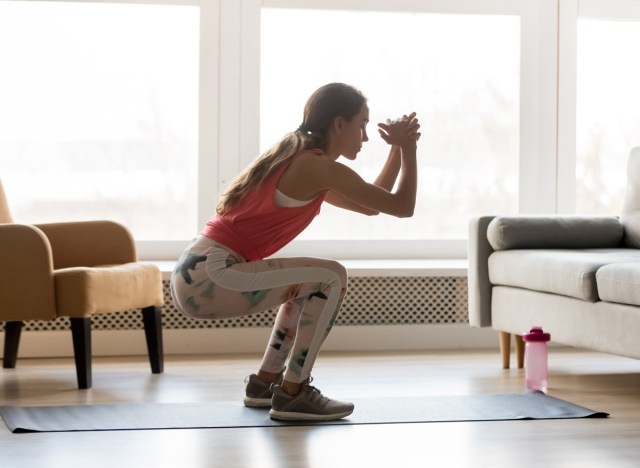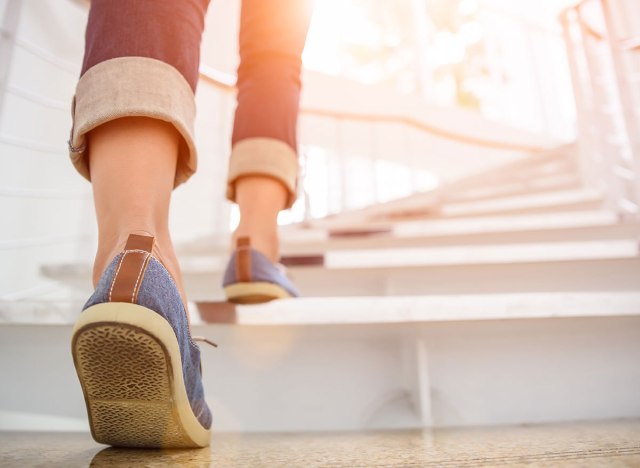Even if you haven’t heard the term “pandemic posture” yet, there’s a good chance you could be feeling its effects. After all, a full year of lockdowns, the mass shuttering of gyms, commuting to-and-from from the bedroom and dining room, and the accumulated effects of restricted movement on a never-before-seen scale have no doubt taken a toll on all of on our bodies.
According to a new article in Glamour, “pandemic posture” is a secondary “epidemic” that has arisen from all of us working from home. It’s essentially defined as slouching in front of our computers with rounded shoulders “in dining room chairs that would have chiropractors screaming.” If this sounds familiar, take heed.
“Pandemic posture can also put excessive pressure on the spine, which causes nerve damage, strained muscles, and weakness in the lower back,” Gbolahan Okubadejo, M.D., a New York-based spinal and orthopedic surgeon, explained to the magazine.
This poor sitting posture also adds stiffness and pain to your hips. “A hunched back can also cause poor circulation; this affects oxygen supply and can lead to blood clots and high blood pressure,” Okubadejo explained further. “The long-term effects of pandemic posture include, but are not limited to, arthritis, circulation issues, temporomandibular joint syndrome, fatigue, headaches, and mild to moderate depression.”
RELATED: One Huge Side Effect of Going for More Casual Walks, Says New Study
The report also notes that you can’t just battle back from pandemic posture by trying to work out hard on weekends. “There are a lot of people who will sit around all week, and then on the weekend they want to be the workout warriors,” Ileana Piña, M.D., professor of medicine at Wayne State University and Central Michigan University, told Glamour. “It’s the totality of the activity that matters.”
When you sit too much every day, the side effects include everything from weight gain to muscle pain to poor sleep to an even greater risk of heart disease down the road. It affects your mind, as well. According to a new study conducted by researchers at the University of Illinois at Urbana-Champaign and published in the International Journal of Obesity, you’ll be hurting your attention span and making yourself much more vulnerable to distraction.
According to the health experts at Yale Medicine, it’s important that you have an ergonomically proper desk set-up. For starters, your computer screen should be at eye-level, so you’re not looking downward and adding that extra strain to your neck. You should sit with your feet flat on the floor, and your arms and legs should remain at 90 degrees. If you’re not so lucky as to have a perfect office chair with lumbar support, “you could just roll up a small towel and place it along the ‘small’ of your lower back when you sit for comfort.”
For a few more ways to make sure you’re moving around a bit more and not causing lasting damage to your body, read on. And for more ways to get fitter faster, don’t miss this list of 50 Amazing Workouts You Can Do in 5 Minutes.
If you feel up to using a standing desk, great. If not, simply sit on a yoga ball. As Jill Koegel, RD, a sports-certified registered dietitian, once explained to us, sitting on an exercise ball can burn an extra 100 calories a day.
For more healthy living news, make sure to sign up for our newsletter!

Squats are one of the best exercises there is—you can do them anywhere without any equipment, and they utilize your body’s single largest muscle group, which make them hugely effective. “Squats are great for toning your thighs and booty,” Tone It Up founders Karena Dawn and Katrina Scott explained to us. “Just make sure that your feet are hip-width apart and knees don’t go past your toes throughout the move. This will help prevent injury.” And for more great effective workout tips you can use, see our roundup of Simple Ways to Start Losing Weight Immediately, Say Experts.

“One amazing way to burn more fat easily all day long is to rev up your metabolism in short intervals at various points during the day,” says Alicia Filley, PT, a physical therapist and founder of The Healthy Hiker. “Doing this throughout your day is easy without doing any formal exercise.”
She recommends taking the stairs anywhere you’re going—be it at work or in a parking garage while you’re out running errands—and, if you’re staying home, climb the stairs there. “Doing this several times a day bumps up your heart rate and will cause you to burn more calories,” she says.

A brisk 20-minute walk should carry you the distance of roughly one mile and require you to take somewhere in the realm of 2,000 and 3,000 steps. It can burn up to 110 calories. A major study published in 2015 in The American Journal of Clinical Nutrition found that a 20-minute walk every day (again, it should be a brisk walk) could reduce your risk of death by 30%. According to research by the University of Georgia and published in the journal Psychotherapy and Psychosomatics, going for a 20-minute walk for just three days a week for six weeks can result in 20% more energy levels and less fatigue. For more great exercise advice, make sure you’re aware of The Single Best Way to Work Out Every Day, According to Psychologists.


























